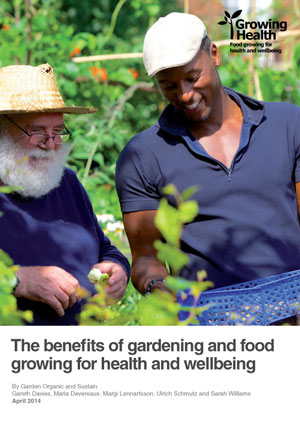New study presents compelling case for GPs to put food growing 'on prescription'
Community food growing can improve fitness and healthy eating, alleviate symptoms of mental illness, and help cancer sufferers cope with treatment. The study's authors want health professionals to put community food growing 'on prescription'. A new study [1] has shown that community food growing can improve people’s overall fitness and healthy eating, alleviate the symptoms of mental illness, and help cancer sufferers cope with the distressing effects of their treatment.
A new study [1] has shown that community food growing can improve people’s overall fitness and healthy eating, alleviate the symptoms of mental illness, and help cancer sufferers cope with the distressing effects of their treatment.
The authors undertook a review of international scientific research demonstrating the benefits of gardening and community food growing for physical and mental wellbeing. They are now calling on health professionals to put community food growing ‘on prescription’, for the many health benefits this would achieve.
Entitled ‘The Benefits of Gardening and Food Growing for Health and Wellbeing’, the study will be launched at a conference for health professionals and food growing project organisers, taking place 2nd April 2014 in London [2]. The conference is organised by Growing Health [3], a charitable initiative helping community food growing projects to demonstrate their benefits and persuade GPs and local health services to invest in the support and services they can provide.
“For the large number of people in our society – children and adults – who live with challenging physical or mental health problems, gardening and community food growing can be especially beneficial,” said Professor Tim Lang [4], chair of the Growing Health conference. “Such activities can relieve the symptoms of serious illnesses, prevent the development of some serious conditions, reduce stress and introduce people to a way of life that can help them to improve their own well-being in the longer term.”
The Growing Health organisers have reviewed many working examples of GPs and health professionals already using community food growing to treat physical and mental health conditions [5]. One example, whose organisers will share their experiences at the conference, is Sydenham Gardens in South London [6], founded by local residents and a local GP to provide gardening, nature conservation and creative opportunities for local people. Patients are referred to the project through their GP or key worker.
“This important new study of the evidence for the benefits of gardening and community food growing is a call to action for health professionals,” said Maria Devereaux, Growing Health project officer. “Pioneering action, already piloted by local GPs and health authorities, to put gardening and food growing ‘on prescription’ should now be recognised and replicated throughout the NHS, and local authority planners should protect and create food growing spaces, for the benefit of everyone.”
The Growing Health conference will feature inspiring case studies of food growing ‘on prescription’, and a presentation from Joe Sempik of the University of Nottingham – a leading authority on social and therapeutic horticulture – on how food growing projects can measure their benefits to prove their worth to the health service.
ENDS
For press enquiries, please contact: Growing Health project officers, Maria Devereaux maria@sustainweb.org or Sarah Williams sarah@sustainweb.org; tel: 0203 5596 777
Notes to editors
- The full study ‘The Benefits of Gardening and Food Growing for Health and Wellbeing’, is now available for download.
- Conference details: Growing for Health: Community food growing – a natural part of the health service. The conference takes place 2nd April 2014, 1pm to 5.15pm, at The London Resource Centre, 356 Holloway Road, London N7 6PA. Attendance is free of charge to Growing Health network members. To sign up, visit: www.growinghealth.info
- Growing Health is a national project run by the charities Garden Organic (www.gardenorganic.org.uk) and Sustain: The alliance for better food and farming (www.sustainweb.org), and funded by the Tudor Trust charitable foundation. The project aims to see how community food growing can be routinely used by the health and social care services as a way of promoting health and wellbeing for a range of individuals and population groups. See: www.growinghealth.info
- Tim Lang is professor of food policy at the Centre for Food Policy at City University London. He is also a Fellow of the Faculty of Public Health, President of the charity Garden Organic, and a keen vegetable grower. See: www.city.ac.uk/people/academics/timothy-lang
- Several case studies of GPs and health professionals using gardening and food growing to treat health conditions are published at: www.sustainweb.org/growinghealth/case_studies/
- The Sydenham Gardens case study is downloadable at: https://www.sustainweb.org/publications/?id=285
01/04/2014
Support our work
Your donation will help communities grow more food in gardens across London.
Capital Growth is a project of Sustain: the alliance for better food and farming.
Expert food growers wanted for Capital Growth’s 2025 training program
Celebrate the abundance in London this September with Urban Harvest
Behind the garden gate: how London’s food gardens are producing much more than just food




